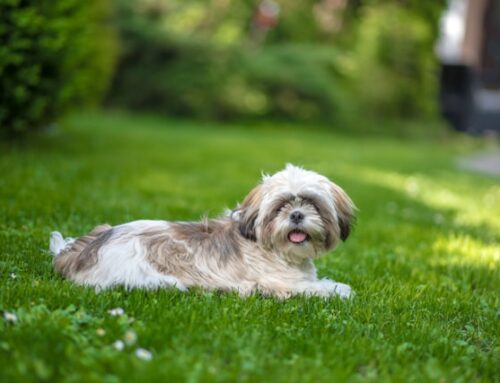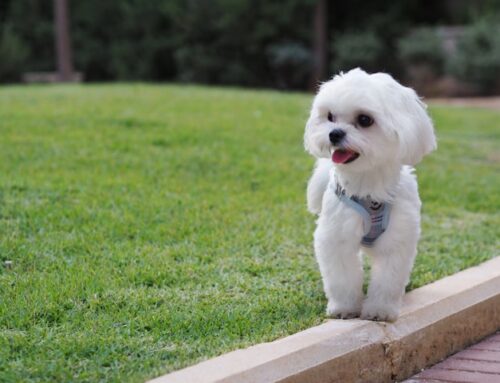Overview
Introduction: Bichon Frise Lifespan
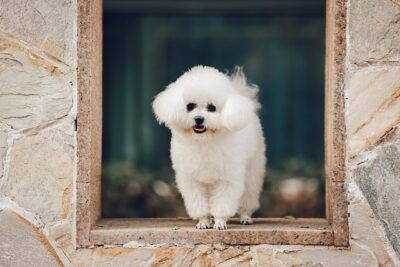
Bichon Frise dogs are bundles of joy, known for their fluffy coats and charming personalities. But as a responsible dog owner, it’s crucial to understand the lifespan of your furry friend, whether they’re a Bichon Frise puppy or an adult.
Let’s delve into this captivating journey together. From joining a Bichon Frise club to learning how to pronounce ‘Bichon Frise,’ there are many aspects to explore. Additionally, proper Bichon Frise training is essential for ensuring a happy and healthy relationship between you and your beloved companion.
Understanding the lifespan of your Bichon Frise allows you to provide the best possible care and enjoy many wonderful years together. Learn more about Bichon Frise lifespan and how to maximize your furry friend’s time with you.
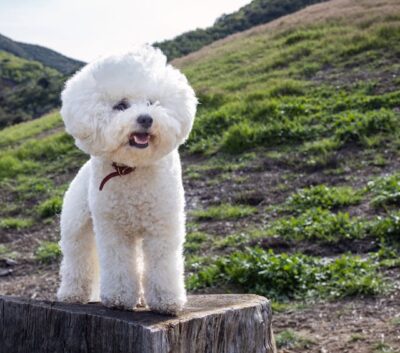
Brief Overview of the Bichon Frise Breed
The Bichon Frise breed, often pronounced as “Bee-shon Free-zay,” has a rich history dating back to the French Revolution, where they were favored companions of European nobility. Bichon Frise puppies are known for their playful and affectionate nature, making them wonderful family pets.
Recognized by the American Kennel Club, Bichon Frises are generally healthy dogs with a lifespan of 12 to 15 years. Originating from Mediterranean roots, they are believed to have descended from the Barbet, a water spaniel breed. Their distinctive fluffy coat requires regular grooming, and responsible breeding practices help maintain the breed’s health and temperament standards.
The Bichon Frise’s popularity has led to the development of hybrid breeds such as the Shichon, a mix of the Bichon Frise and Shih Tzu. Shichons are known for their friendly and affectionate nature, inheriting the best traits from both parent breeds. Like Bichon Frises, Shichons require regular grooming to maintain their fluffy coats and benefit from responsible breeding practices to ensure their health and temperament.
To learn more about the Bichon Frise lifespan and how to care for these delightful companions, it’s essential to research and consult with reputable breeders and veterinarians. Proper care and attention can help ensure that your Bichon Frise or Shichon leads a happy and healthy life as a beloved member of your family.
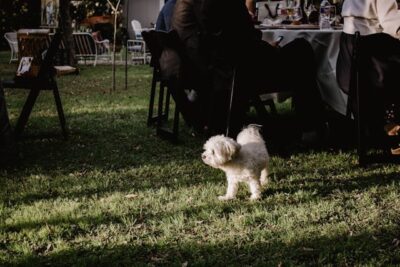
Importance of Understanding Bichon Frise Lifespan
Understanding the lifespan of Bichon Frise puppies is essential for prospective owners, as it allows for proper planning and care throughout their lives. The Bichon Frise lifespan typically ranging from 12 to 15 years, knowing the life expectancy of a Bichon Frise puppy ensures that owners can provide adequate support and attention to their furry companions as they grow older.
Additionally, grasping the pronunciation of “Bichon Frise” (pronounced “Bee-shon Free-zay”) and recognizing the breed’s distinct characteristics, such as their curly coats and cheerful demeanor, fosters a deeper connection and appreciation for these beloved dogs throughout their journey. Discover more about the Bichon Frise lifespan and how to provide the best care for these delightful companions.
Understanding Bichon Frise Lifespan
As with any living creature, understanding the lifespan of a Bichon Frise involves considering various factors that influence their longevity.
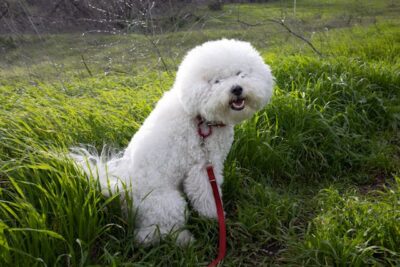
Defining Lifespan in Dogs
Defining lifespan in dogs, such as the Bichon Frise, involves understanding the average life expectancy of the breed. Bichon Frises, known for their playful and affectionate nature, typically live between 12 to 15 years. However, various factors, including genetics, diet, exercise, and overall health care, can influence how long a Bichon Frise lives.
To ensure a Bichon Frise lives a long and healthy life, it’s crucial to obtain them from a reputable breeder. Responsible breeding practices can help reduce the risk of hereditary health issues that may affect their lifespan. Additionally, providing a balanced diet, regular exercise, and proper veterinary care can help extend a Bichon Frise’s life expectancy, similar to other dogs.
As a French dog breed with a lively disposition, Bichon Frises require love, attention, and proper care to thrive. Understanding the factors that impact their lifespan and taking proactive steps to address them can help Bichon Frises live a fulfilling life as beloved companions.
Factors Affecting Lifespan in Bichon Frise
Several factors influence the lifespan of Bichon Frises, beloved small dogs among pet owners. Proper care, including regular veterinary check-ups, a balanced diet, exercise, and maintaining a healthy weight, are crucial for ensuring Bichon Frises live long and healthy lives.
Genetic predispositions and environmental factors also play significant roles in determining the lifespan of these charming Bichon Frisé companions. Owners can optimize their Bichon Frise’s longevity by attentively addressing these factors throughout their lives.

Bichon Frise Lifespan: From Puppyhood to Senior Years
A Bichon Frise’s lifespan can be divided into distinct stages, each with its own characteristics and needs.
Puppyhood: Development and Growth
During puppyhood, Bichon Frises, like many companion dogs, undergo significant development and growth. Pet parents of Bichon Frises often marvel at their furry friends’ rapid progress during this stage.
Proper care and nutrition, along with early socialization, are essential for ensuring healthy growth and laying the foundation for a long life span, comparable to other breeds. Early socialization helps prevent undesirable behaviors and fosters a well-adjusted adult dog. As they mature, Bichon Frises continue to charm their owners with their playful nature and affectionate demeanor, solidifying their reputation as beloved companion dogs.
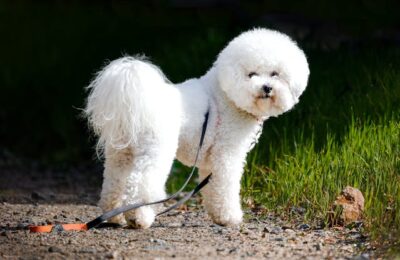
Adult Stage: Prime Years of Life
During the adult stage, typically spanning from around 1 to 10 years old, Bichon Frises experience their prime years of life. These are the years when they exhibit their full vitality, intelligence, and affectionate nature.
Pet owners cherish this stage as they witness their Bichon Frises thrive, enjoying companionship and bringing joy to their households with their playful antics and loyal demeanor. With proper care and attention to their health needs, Bichon Frises can continue to flourish well into their adult years.
Senior Years: Signs of Aging
As Bichon Frises enter their senior years, typically around 10 years old and beyond, pet owners may notice signs of aging. These may include decreased energy levels, joint stiffness, dental issues, and changes in vision or hearing. Despite these signs, with attentive care and adjustments to their lifestyle, Bichon Frises can continue to enjoy a comfortable and fulfilling life well into their golden years, bringing joy to their families as cherished companions.
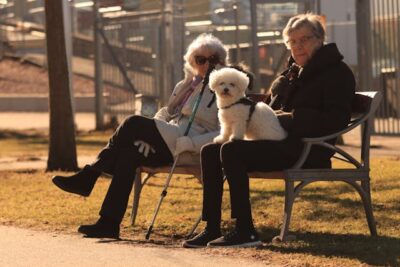
Average Bichon Frise Lifespan
Research and statistics provide valuable insights into the typical lifespan of Bichon Frises compared to other dog breeds.
Research and Statistics
Research and statistics indicate that the average lifespan of a Bichon Frise, a beloved companion dog breed, typically ranges from 12 to 15 years, similar to many other dogs of their size and temperament.
While individual variations may occur, factors such as proper healthcare, nutrition, and exercise play significant roles in determining how long Bichon Frises live. By providing attentive care and a nurturing environment, pet owners can help ensure that their Bichon Frises enjoy a long and fulfilling life as cherished members of the family.
Comparisons With Other Dog Breeds
When compared to other dog breeds, the average lifespan of Bichon Frise, adaptable companions known for their small size and friendly demeanor, typically falls within the range of 12 to 15 years.
While individual variations exist, Bichon Frises often exhibit longevity similar to or even surpassing that of many other small dog breeds. Their cheerful disposition and adaptability make them beloved companions, cherished for their companionship and loyalty throughout their lives.
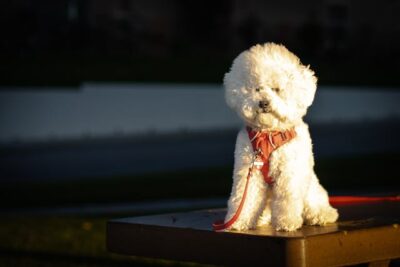
Factors Influencing Bichon Frise Lifespan
Several factors contribute to the lifespan of a Bichon Frise, including genetics, nutrition, exercise, and environmental factors.
Genetics and Breed Health
Genetics and breed health are significant factors influencing the lifespan of Bichon Frises. While they are generally healthy dogs, they may be prone to certain health problems such as Cushing’s disease, bladder infections, ear infections, bladder stones, and eye diseases.
Regular veterinary check-ups, proper nutrition, and preventive care can help mitigate these health problems, ultimately contributing to a longer and healthier life for Bichon Frises.

Nutrition and Diet
Nutrition and diet play a crucial role in influencing the lifespan of Bichon Frises. Providing proper nutrition through high-quality dog food tailored to their specific needs can contribute to a longer and healthier life span.
Bichon Frise owners need to avoid feeding their pets human foods that may be harmful to their health. By ensuring a balanced diet and avoiding potentially harmful foods, pet owners can help their Bichon Frises live long and fulfilling lives.
Exercise and Physical Activity
Exercise and physical activity significantly influence the lifespan of Bichon Frises. These energetic dogs love quality playtime and human interaction, making regular exercise essential for their well-being. Bichons enjoy participating in activities such as walks, games, and play sessions in a fenced-in backyard.
However, it’s crucial for pet owners to avoid harsh or negative methods during exercise, as positive reinforcement and gentle guidance are more effective in promoting a healthy and happy lifestyle for Bichon Frises.
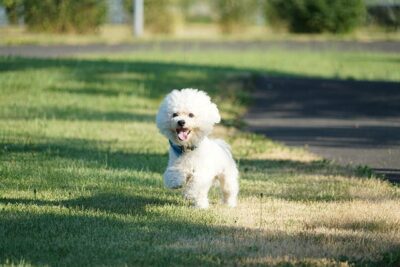
Environmental Factors
Environmental factors play a significant role in influencing the lifespan of Bichon Frises. Providing a safe and nurturing environment free from hazards, toxins, and stressors is essential for their well-being.
Additionally, maintaining comfortable living conditions, including appropriate temperature, humidity levels, and access to fresh water and nutritious food, can contribute to a longer and healthier life for Bichon Frises. Regular veterinary care and preventive measures against parasites and diseases further support their overall health and longevity.
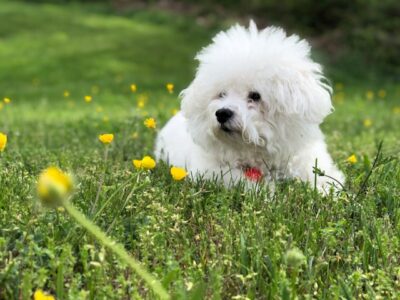
Common Health Conditions Affecting Bichon Frise Lifespan
Understanding common health issues prevalent in Bichon Frises helps in early detection and proactive management.
Genetic Predispositions
Genetic predispositions can significantly impact the lifespan of Bichon Frises, leading to the development of common health conditions. Conditions such as Cushing’s disease, bladder infections, ear infections, bladder stones, and eye diseases are prevalent among this breed due to genetic factors.
Regular veterinary check-ups, early detection, and appropriate management of these conditions are essential for ensuring a longer and healthier life for Bichon Frises. Additionally, responsible breeding practices aimed at minimizing the transmission of genetic health issues can help mitigate their impact on the breed’s overall lifespan.

Orthopedic Concerns
Orthopedic concerns are common health conditions that can affect the lifespan of Bichon Frises. These concerns may include hip dysplasia, luxating patella (dislocated kneecaps), and osteoarthritis, which can cause discomfort and mobility issues in affected dogs.
Proper nutrition, weight management, regular exercise, and veterinary care are crucial in managing orthopedic conditions and promoting a longer and healthier life for Bichon Frises. Additionally, early detection and intervention through diagnostic testing and treatment can help mitigate the impact of orthopedic concerns on their overall lifespan.
Dental Health
Dental health is a crucial aspect of overall well-being that can significantly impact the lifespan of Bichon Frises. Periodontal disease, tooth decay, and gum infections are common dental issues that, if left untreated, can lead to pain, discomfort, and even systemic health problems in Bichon Frises.
Regular dental care, including brushing, dental cleanings, and dental examinations by a veterinarian, is essential for maintaining optimal oral health and promoting a longer and healthier life for these beloved dogs.

Skin Conditions
Skin conditions are prevalent health concerns that can affect the lifespan of Bichon Frises, especially for allergy sufferers. Issues such as allergies, dermatitis, and infections can lead to discomfort, itching, and skin lesions if not properly managed.
Regular grooming, including daily brushing to prevent matting and maintain their minimal shedding coat, along with appropriate skincare and veterinary consultation, are essential for diagnosing and treating skin conditions. These measures contribute to improving the quality of life and longevity of Bichon Frises, ensuring they remain happy and healthy companions for their owners.
Enhancing Bichon Frise Lifespan
Taking proactive measures to enhance the lifespan of your Bichon Frise involves prioritizing their health and well-being.
Proper Healthcare and Veterinary Attention
Enhancing the lifespan of Bichon Frises involves prioritizing proper healthcare and veterinary attention. Regular check-ups, vaccinations, and preventive treatments help detect and address health issues early on, contributing to a longer and healthier life for these beloved companions.
Additionally, maintaining open communication with a trusted veterinarian ensures that any concerns or changes in behavior are promptly addressed, further promoting the well-being and longevity of Bichon Frises.

Balanced Diet and Nutrition
Enhancing the lifespan of Bichon Frises involves providing a balanced diet and proper nutrition. A diet tailored to their specific needs, including high-quality dog food rich in essential nutrients, supports overall health and vitality.
Ensuring access to fresh water and avoiding overfeeding helps maintain a healthy weight, reducing the risk of obesity-related health issues and promoting a longer and happier life for Bichon Frises.
Regular Exercise and Mental Stimulation
Enhancing the lifespan of Bichon Frises involves prioritizing regular exercise and providing mental stimulation. Bichons tend to thrive with daily physical activity and mental challenges, which help maintain their overall health and well-being.
Incorporating activities such as walks, play sessions, and interactive toys not only ensures that Bichon Frises live an active lifestyle but also stimulates their minds, contributing to a longer and more fulfilling life.
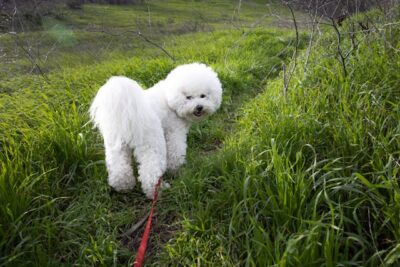
Signs of Aging in Bichon Frise
Recognizing the signs of aging in your Bichon Frise allows for early intervention and improved quality of life in their later years.
Behavioral Changes in Bichon Frise
Signs of aging in Bichon Frises often manifest through behavioral changes. As they grow older, Bichons may become less active, sleep more, or exhibit changes in appetite or temperament.
It’s essential for pet owners to be attentive to these behavioral shifts and consult with a veterinarian if they notice any concerning changes, as early detection and management of age-related issues can help maintain their quality of life as they age.
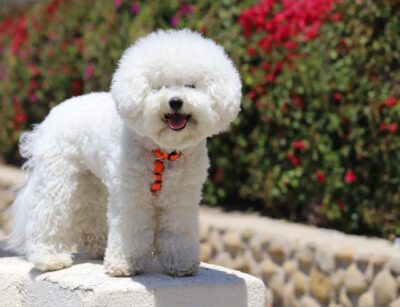
Physical Indications in Bichon Frise
Signs of aging in Bichon Frises may include physical indications such as graying or whitening of the coat, decreased mobility, and the development of age-related health conditions like arthritis or dental issues. Pet owners should monitor their Bichon Frises closely for these physical changes and seek veterinary attention if necessary to address any discomfort or health concerns.
Early detection and proactive management of age-related changes can help ensure a comfortable and healthy aging process for Bichon Frises.
Cognitive Decline in Bichon Frise
Signs of aging in Bichon Frises may also include cognitive decline, which can manifest as confusion, disorientation, or changes in behavior. Pet owners may notice their Bichon Frises becoming forgetful or less responsive to commands as they age.
It’s important to provide extra patience, support, and mental stimulation to elderly Bichon Frises to help maintain their cognitive function and overall well-being as they navigate the challenges of aging.

Bichon Frise Lifespan Myths vs. Facts
Dispelling common misconceptions about the lifespan of Bichon Frises helps owners make informed decisions about their care.
Debunking Common Misconceptions
Debunking common misconceptions about Bichon Frise lifespan involves distinguishing myths from facts. While some may believe that Bichon Frises have shorter lifespans due to their small size, the reality is that with proper care and attention, they can live relatively long and healthy lives, often reaching 12 to 15 years.
Understanding the factors that influence their lifespan, such as genetics, nutrition, and preventive healthcare, helps dispel myths and ensures that Bichon Frise owners can provide the best possible care for their furry companions.
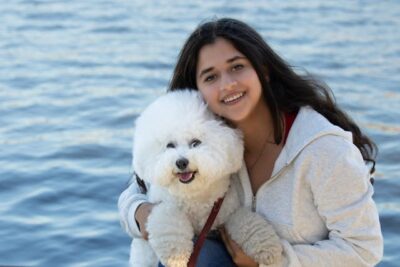
Tips for Prolonging Bichon Frise Lifespan
Implementing practical tips can help extend the lifespan and enhance the quality of life for your beloved Bichon Frise.
Early Detection and Treatment of Health Issues
Prolonging your Bichon Frise’s lifespan involves prioritizing early detection and treatment of health issues. Regular veterinary check-ups and proactive monitoring allow for the timely identification of any potential health concerns, enabling prompt intervention and treatment.
By addressing health issues early on, you can help ensure a longer and healthier life for your Bichon Frise, enhancing their overall well-being and quality of life.

Quality of Life Considerations
Tips for prolonging your Bichon Frise’s lifespan include considering their quality of life. Providing a balanced diet, regular exercise, mental stimulation, and a loving environment are crucial for ensuring their well-being.
Additionally, addressing any signs of discomfort or aging-related issues promptly can contribute to enhancing their overall quality of life and extending their lifespan.
Importance of Routine Veterinary Visits
To prolong your Bichon Frise’s lifespan, prioritize routine veterinary visits. Regular check-ups allow for early detection of potential health issues, enabling timely intervention and treatment. Veterinary professionals can provide tailored advice on nutrition, preventive care, and overall well-being, ensuring your Bichon Frise remains healthy and happy for years to come.
Conclusion: Bichon Frise Lifespan
In conclusion, understanding the lifespan of a Bichon Frise is essential for any pet owner embarking on the journey of caring for these delightful companions. From puppyhood to their golden years, Bichon Frises bring boundless joy and love to our lives.
By recognizing the factors that influence their lifespan, implementing proactive measures to promote their health and well-being, and staying vigilant for signs of aging or health issues, we can ensure that our beloved Bichon Frises enjoy long, happy, and fulfilling lives as cherished members of our families. With proper care and attention, our furry friends will continue to bless us with their presence for many wonderful years to come.
If you’re curious about the Bichon Frise lifespan, it’s important to note that these fluffy companions typically live between 12 to 15 years, although some may live even longer with excellent care.
If you’re interested in bringing a Bichon Frise into your family, consider our thoughtfully bred Bichon puppies available in Georgia and surrounding areas.
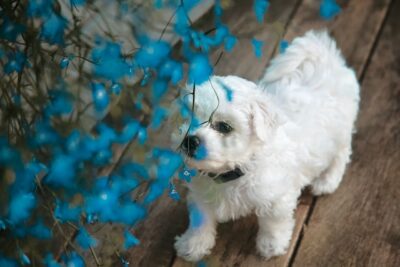
Frequently Asked Questions (FAQs): Bichon Frise Lifespan
- How long does Bichon Frises typically live compared to other dogs?
- Bichon Frises generally have a lifespan of 12 to 15 years, which is comparable to many other small to medium-sized breeds. Their longevity often surpasses that of larger breeds, making them a great choice for pet owners seeking a long-term canine companion.
- Are Bichon Frises known to live longer than other breeds?
- While Bichon Frises may not have the longest lifespan among all dog breeds, they do tend to live longer than some other breeds, particularly larger breeds. Their average lifespan of 12 to 15 years makes them a popular choice for most pet owners seeking a loyal and long-lasting companion.
- Are Bichon Frises considered ideal city dogs due to their lifespan?
- Yes, Bichon Frises are often considered ideal city dogs not only because of their small size but also because of their relatively long lifespan. Their adaptability to urban living, coupled with their friendly demeanor and manageable exercise needs, make them favored companions for city dwellers.
- How can I ensure that my Bichon Frise lives a long and healthy life?
- To maximize your Bichon Frise’s lifespan, it’s crucial to obtain your pet from a responsible breeder who prioritizes health and genetic testing in their breeding stock. Additionally, providing proper nutrition, regular exercise, routine veterinary care, and a loving environment are key factors in ensuring a long and healthy life for your furry friend.
- Can Bichon Frises live harmoniously with other pets?
- Yes, Bichon Frises generally get along well with other pets, including dogs and cats, particularly if they are socialized from a young age. Their friendly and gentle nature, combined with proper introductions and supervision, make them excellent companions for households with multiple pets.
- What group does Bichon Frises belong to?
- Bichon Frises belong to the non-sporting group according to the American Kennel Club (AKC). This group includes a diverse range of breeds with various sizes, temperaments, and characteristics, but they all share the common trait of not fitting into any of the other AKC breed groups.
- How has modern development impacted the lifespan of Bichon Frises?
- Modern advancements in veterinary care, nutrition, and breeding practices have contributed to improving the overall health and lifespan of Bichon Frises. Responsible breeding aimed at reducing genetic health issues and providing optimal care throughout their lives has helped ensure that Bichon Frises enjoy longer and healthier lifespans than in the past.
- What is the average height of a Bichon Frise?
- Bichon Frises typically stand at around 9 to 12 inches tall at the shoulder when fully grown. This small stature, combined with their friendly demeanor and manageable exercise needs, makes them an ideal dog for most pet owners, especially those living in apartments or smaller homes.



